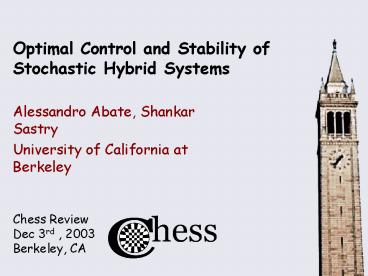Optimal Control and Stability of Stochastic Hybrid Systems - PowerPoint PPT Presentation
1 / 20
Title:
Optimal Control and Stability of Stochastic Hybrid Systems
Description:
What are Hybrid Systems? A set of discrete states. Associated with each discrete state k ... General Stochastic Hybrid Systems. X(t): Ordinary or stochastic ... – PowerPoint PPT presentation
Number of Views:43
Avg rating:3.0/5.0
Title: Optimal Control and Stability of Stochastic Hybrid Systems
1
Optimal Control and Stability of Stochastic
Hybrid Systems
- Alessandro Abate, Shankar Sastry
- University of California at Berkeley
2
What are Hybrid Systems?
- Dynamical systems with interacting continuous and
discrete dynamics
3
Deterministic Hybrid Systems
- A set of discrete states
- Associated with each discrete state k
- invariant set (domain) an open subset Uk of Rn
- dynamics an ODE (or a control system) on Uk
- guards subsets of Uk, or temporal switches
- Associated with each guards,
- discrete transition to (more than) one new
discrete state - continuous transition (reset condition)
- Hybrid executions (St,Xt), t?0
4
Stochastic Hybrid Systems (1)
- A set of discrete states and open domains
- Dynamics inside each domain governed by a SDE
- Stop upon hitting domain boundary
- Boundary of each domain is partitioned into
guards - Deterministically jump to a new discrete state
according to the guard - Reset randomly in the new domain
5
Stochastic Hybrid Systems (1)
6
Stochastic Hybrid Systems (2)
- A set of discrete states and open domains
- Dynamics inside each domain governed by an ODE
- Jump upon hitting domain boundary, or with a
condition in time - Switch to a new discrete state according to a
Transition Probability Matrix - Reset inside the new domain corresponding to a
reset function
7
Stochastic Hybrid Systems (2)
8
General Stochastic Hybrid Systems
- State variables
- continuous variable X
- discrete variable S
- System dynamics
- continuous dynamics
- discrete dynamics
X(t) Ordinary or stochastic differential
equations
9
Interdependent Dynamics
- Discrete dynamics ? continuous dynamics
- Continuous dynamics ? discrete dynamics
dX(t)/dtf(X,S,t)?(X,S,t)dW(t)
- Different continuous dynamics for different S
- Reset of X depends on the discrete transitions
Transition matrix P pij(X)ij1,,K
- Transition probabilities depend on X
- Time between jumps depends on X
10
Optimal Control for Stochastic HS
- Our Approach dynamics according to ODEs,
underlying Markov Chain - Each state i has a reward ri
- An input ui can be applied, at some cost gi(ui),
to reach the boundary with time hi(ui)ltT - Temporal transitions (every T ), spatial if u is
applied - Consider an NT Time Horizon case
- Object Maximize Expectation of
11
Optimal Control for Stochastic HS
- 2 Analyses Infinite Time Horizon, and Finite.
- Infinite Time Horizon E(R) can be expressed in a
deterministic, closed form - Dependence on the steady-state distribution p of
the MC
12
Optimal Control for Stochastic HS
- Finite Time Horizon Bellman-like Approach -gt
computational complexity - But, assuming we are in steady state,
- Main Result the finite-time horizon analysis has
the same optimum as the infinite-time horizon
one. - This implies mathematically, no dependence on
final cost - practically, drastic decrease in
complexity. - Algorithms for the selection of the optimal
control have been proposed.
13
Motivational Example
- Productivity Allocation
- Product pi, manufacture cost ci, price ri
- Market demand oi .
- Choice of production increase (control) w
- production time hi(w), 0lthi(w)ltT
- additional cost gi(w), cltgi(w).
- State i production of pi
- Switching probabilities oi /Ss os.
14
Stability of Stochastic HS
- Dynamics ODEs, possibly nonlinear (flows have
bounded Lipschitz constant) - Underlying Markov Chain
- Temporal transitions (every T time)
- Single Equilibrium q shared among all domains
- Reset maps with bounded Lip constant
15
Stability of Stochastic HS
- Stability in Probability q is (asymptotically)
stable in prob. if, for every D, q e D, there
exists a region E, included in D, s.t. the hybrid
flow starting in any point in D will end up
evolving in E, as time goes to infinity, with
Probability 1. - Assumptions
- n Domains
- Vector fields fi -gt flows ji
- Reset maps Rij
- Steady-state distribution p p1,..., pn
16
Stability of Stochastic HS
- Theorem
- Define
- n Pi1,..,nLip(jiT)pi
- m Pi,j1,..,nLip(Rij )pi Pij
- If n m lt1, then equilibrium q is stable in
probability (sufficient condition). - Extension to switches in time according to
exponential distributions.
17
Stability of Stochastic HS
- Simulation HS with 5 nodes, linear vector
fields, reset maps are the identity, jumps at
fixed times.
18
Applicative Example
- Stocks Pricing Market has fixed number of
equities (n), with an equilibrium price - X of stockholders willing to buy 1 title
- Y of operators willing to sell 1 title
3 regions Equilibrium, Overpricing,
Depreciation
19
Applicative Example
- Every time T, one transaction can be made.
- Model of the Market?
- Given starting domain (status of the market) and
equities value, prediction of the long-term
dynamics of the stocks prices
20
Future Work
- Optimal Control
- More complex dynamics, general reset maps
- Further applications, most likely in biology
- Reward w.r.t. the systems equilibrium gt
relation with the Stability results. - Stability
- Extension to more equilibria per domain
- Investigate other kinds of stability.































